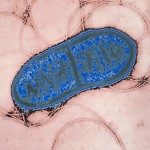Link to Pubmed [PMID] – 38661215
Link to DOI – 10.1093/nar/gkae281
Nucleic Acids Res 2024 Jun; 52(10): 6079-6091
CRISPR-Cas systems can be utilized as programmable-spectrum antimicrobials to combat bacterial infections. However, how CRISPR nucleases perform as antimicrobials across target sites and strains remains poorly explored. Here, we address this knowledge gap by systematically interrogating the use of CRISPR antimicrobials using multidrug-resistant and hypervirulent strains of Klebsiella pneumoniae as models. Comparing different Cas nucleases, DNA-targeting nucleases outperformed RNA-targeting nucleases based on the tested targets. Focusing on AsCas12a that exhibited robust targeting across different strains, we found that the elucidated modes of escape varied widely, restraining opportunities to enhance killing. We also encountered individual guide RNAs yielding different extents of clearance across strains, which were linked to an interplay between improper gRNA folding and strain-specific DNA repair and survival. To explore features that could improve targeting across strains, we performed a genome-wide screen in different K. pneumoniae strains that yielded guide design rules and trained an algorithm for predicting guide efficiency. Finally, we showed that Cas12a antimicrobials can be exploited to eliminate K. pneumoniae when encoded in phagemids delivered by T7-like phages. Altogether, our results highlight the importance of evaluating antimicrobial activity of CRISPR antimicrobials across relevant strains and define critical parameters for efficient CRISPR-based targeting.



